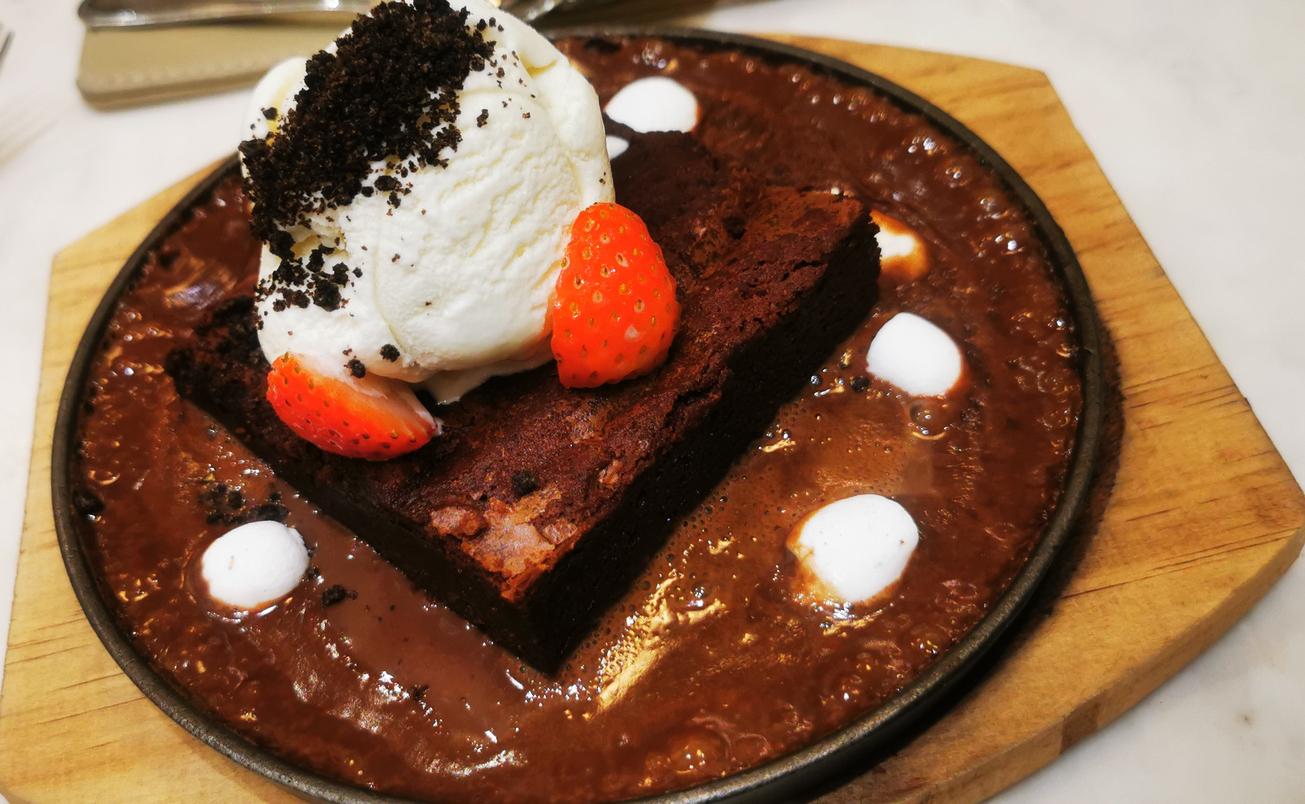
The Guilt Trap: Let’s break free!
Imagine this..
You settle into the cosy corner of the café, waiting for your black coffee when suddenly, the door to indulgence creaks open before you. From the corner of your eye, you spot the waiter carrying a sizzling plate—the chocolate brownie sizzler—to the table next to you. The sound of the sizzle reaches your ears, almost like a tempting whisper, and you immediately catch a waft of warm, rich chocolate.
Your senses awaken—that aroma! It’s sweet, decadent, and impossible to ignore. As the sizzling plate is set down.. the brownie glistens under a thick blanket of molten chocolate.. and a small pool of slowly melting vanilla ice cream starts to swirl into the dark sauce. The steam rises in delicate spirals, carrying a scent that makes your mouth water.
Your black coffee now seems… insufficient. You take a deep breath, trying to focus, but your eyes are glued to that brownie. The way it sizzles, the way it crumbles at the edges but stays gooey in the centre—it’s calling your name. All you want is to reach out, grab that spoon, and dive into that heavenly dessert.
So you indulge in the treat…
What happens next?
The guilt sets in – almost immediately, the guilt hits. You start thinking, “I shouldn’t have eaten that.”
Your body panics – that guilt triggers stress, and your brain thinks, “We’re in trouble!” So, it calls in cortisol, the stress hormone, to handle the “crisis.”
Cortisol gets to work – its job is to store energy in case of future stress, so it starts converting calories into fat, particularly around your belly.
Cravings kick in – cortisol, not satisfied with just storing fat, makes you crave comfort foods. So, instead of resisting, you want more carbs, sugar, or fat.
Metabolism slows down – your body isn’t burning calories as efficiently because it’s in “energy-saving mode.”
And what happens over time? The cycle continues. Weight creeps up, not just from the food but from the ongoing loop of guilt, stress, and cortisol. It becomes a self-sabotaging pattern.
The key takeaway? It’s not just about the calories you consume but how you feel about what you eat. Guilt and stress can make a bigger impact on your body than the food itself, reinforcing that how we relate emotionally to eating truly matters.
A better way to deal with the guilt-food cycle is to shift your mindset and approach to eating:
Practice mindful eating: Focus on the experience of eating without judgment. Savour the flavours, textures, and aromas of your food. Eating slowly and mindfully allows you to enjoy the moment and helps your body recognise when it’s full, preventing overeating.
Release guilt: Understand that enjoying indulgent foods is a natural part of life. Instead of labelling certain foods as “bad” or feeling guilty, embrace the idea of balance and moderation. Guilt is counterproductive—it doesn’t undo the indulgence, it only adds stress.
Break the cycle of stress eating: When stress or guilt arises, identify it, but don’t let it control your eating habits. Instead, practice self-compassion. Acknowledge that everyone has moments of indulgence, and it’s okay.
Get moving after eating: If you need to “counteract” an indulgence, opt for a healthy habit, like walking. This helps your body digest the food better, relieve stress, and refocus your energy without the added guilt.
Develop a positive relationship with food: Rather than seeing food as an enemy, recognise it as a source of enjoyment and nourishment. Building a positive relationship with food can break the cycle of guilt and overeating, leading to healthier choices and more balanced eating habits.
Be kind to yourself.
Guilt is not a response to our actions but to our attachment to who we think we should be. It chains us to the past and blinds us to the possibilities of the present.
- Lifestyle
- Nutrition
- Psychology
- Well-being

The Silent Decline: Why Men Are Losing Testosterone Faster Than Ever
There’s a quiet crisis playing out in men’s health and it has nothing to do with fitness trends or protein shakes. It’s testosterone. And it’s falling fast. Studies show that men today have 20-30% lower testosterone levels than men of the same age two decades ago. That’s not genetics, that’s lifestyle. Every year, the numbers […]

Invisible Emergencies
“Help. Help. Help. I am drowning.” “Maybe we can come back tomorrow to rescue this poor lad… I’m sure they can hang in a little longer…” said no one ever. Because physical injury is visible. The need for repair seems obvious. It’s instinctual to identify a human in crisis — an accident, a burn, a […]

 Workplace Well-being
Workplace Well-being Reinforced Learning
Reinforced Learning Collaboration
Collaboration